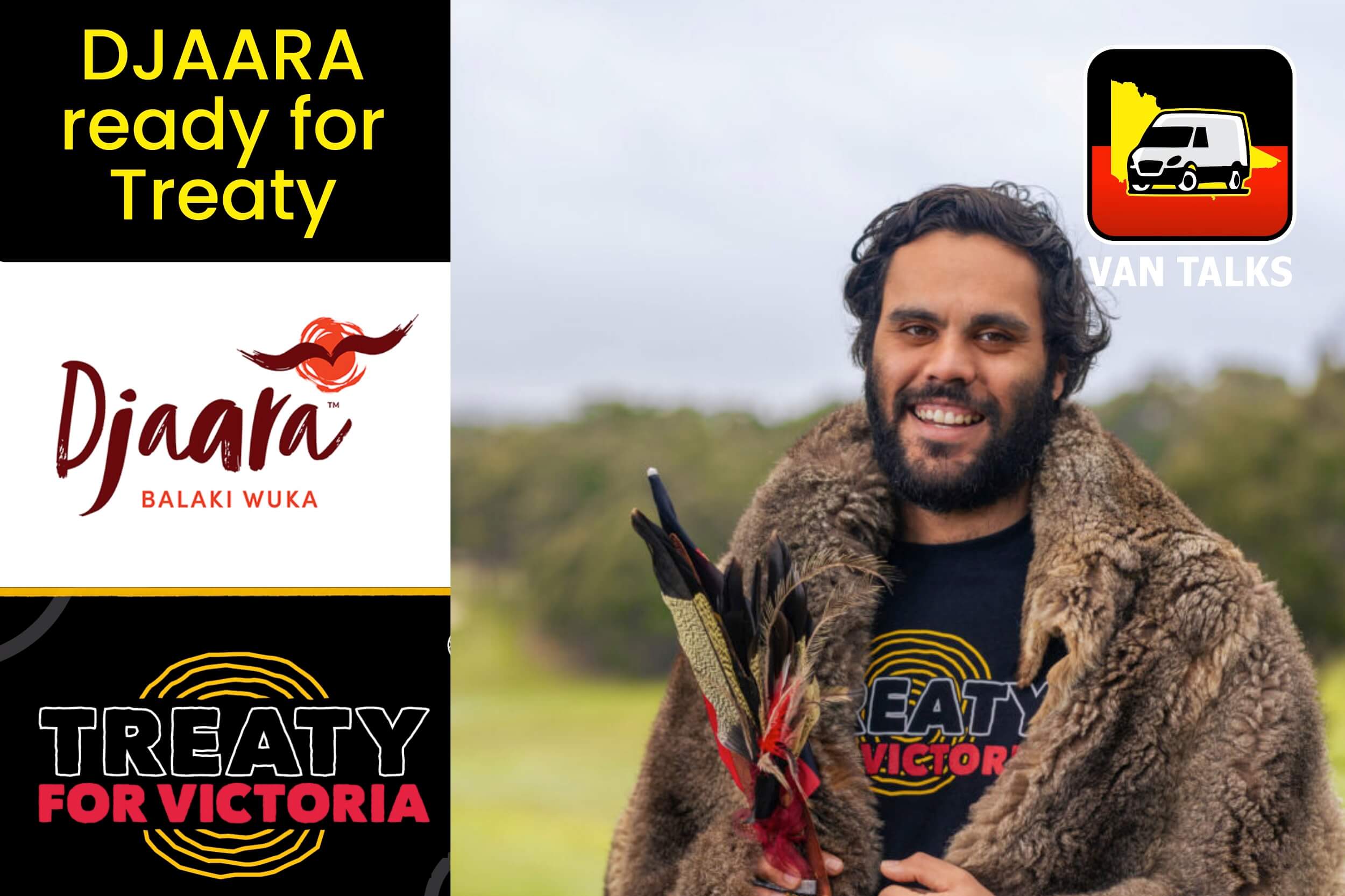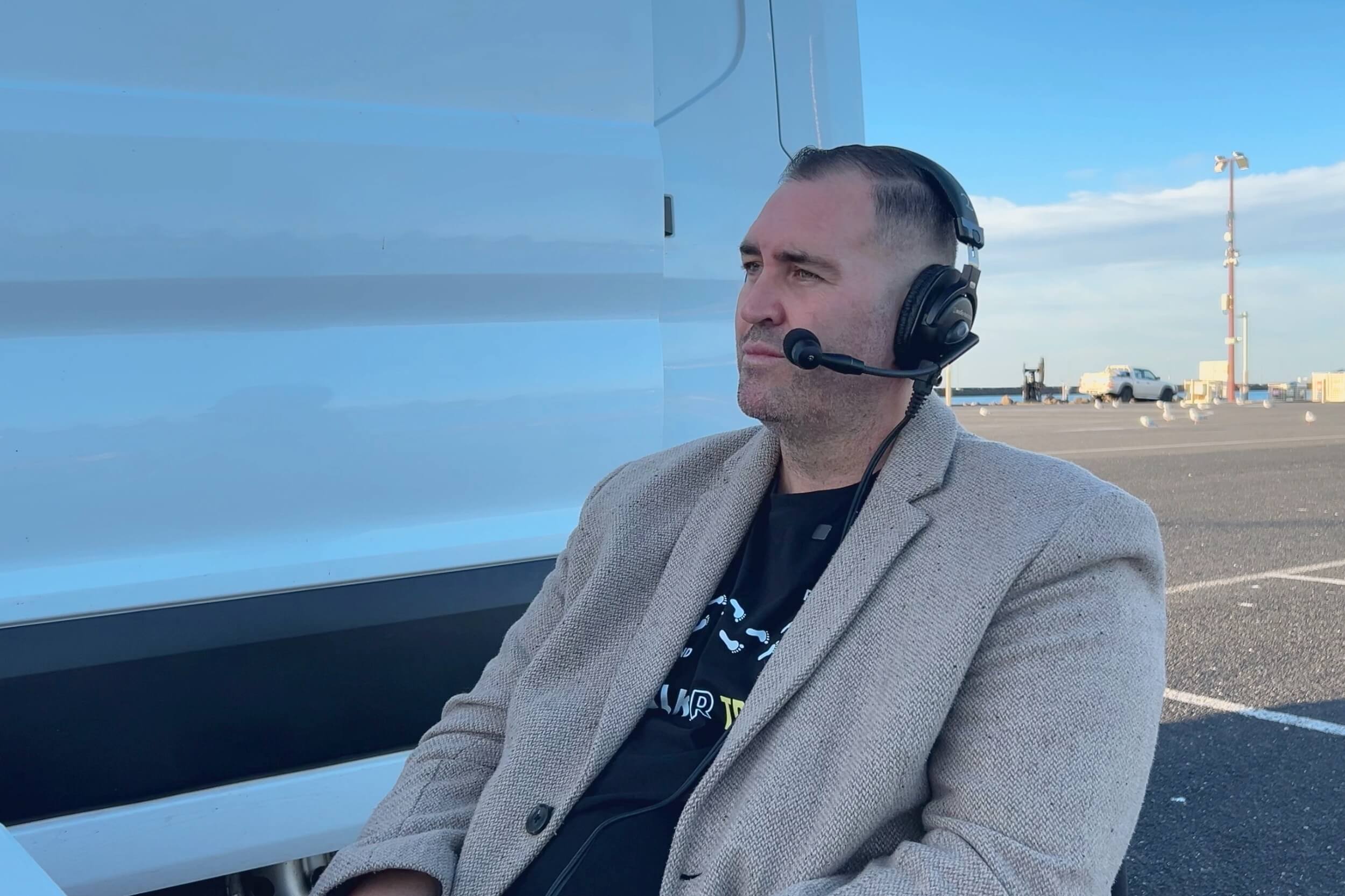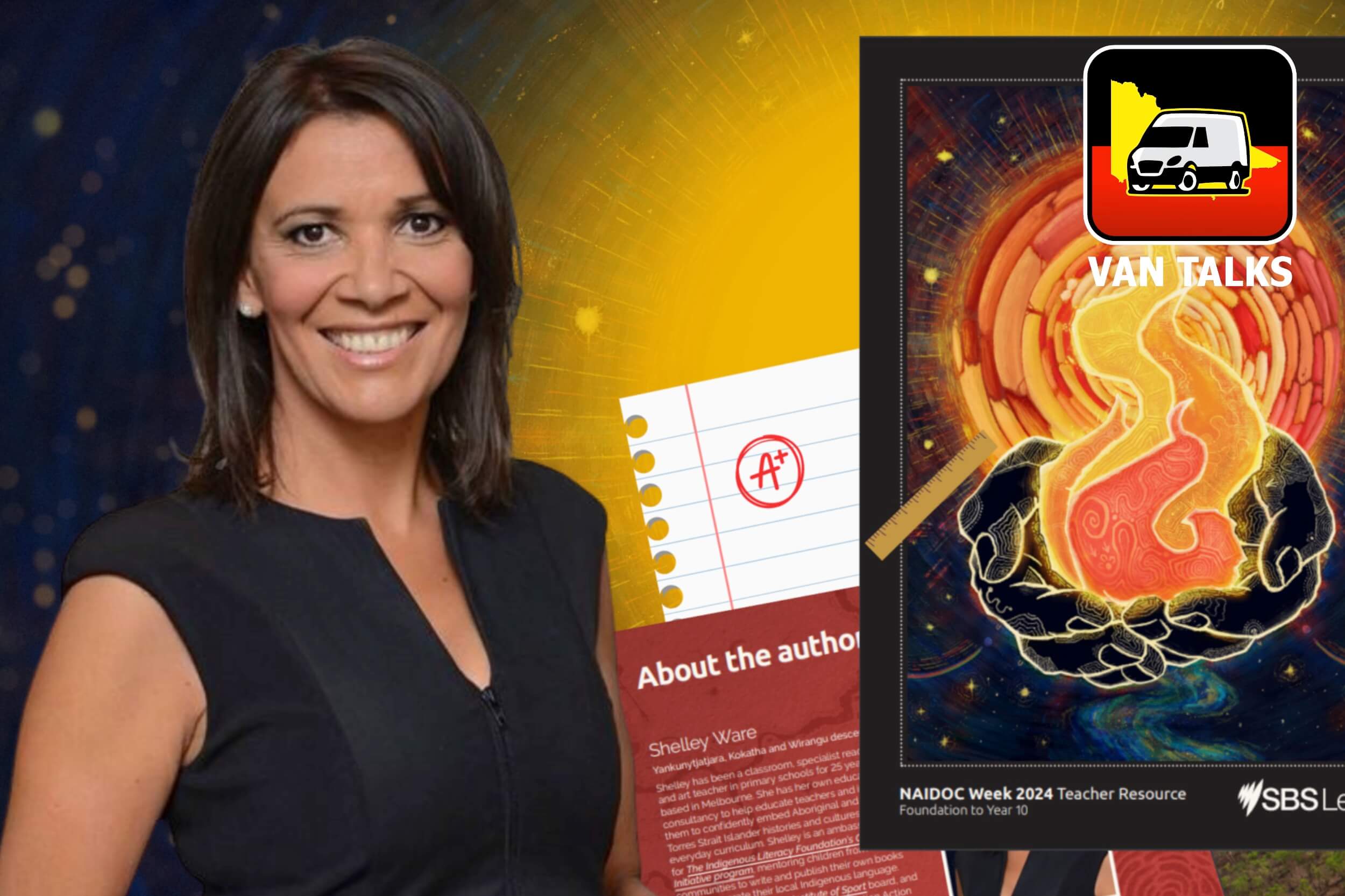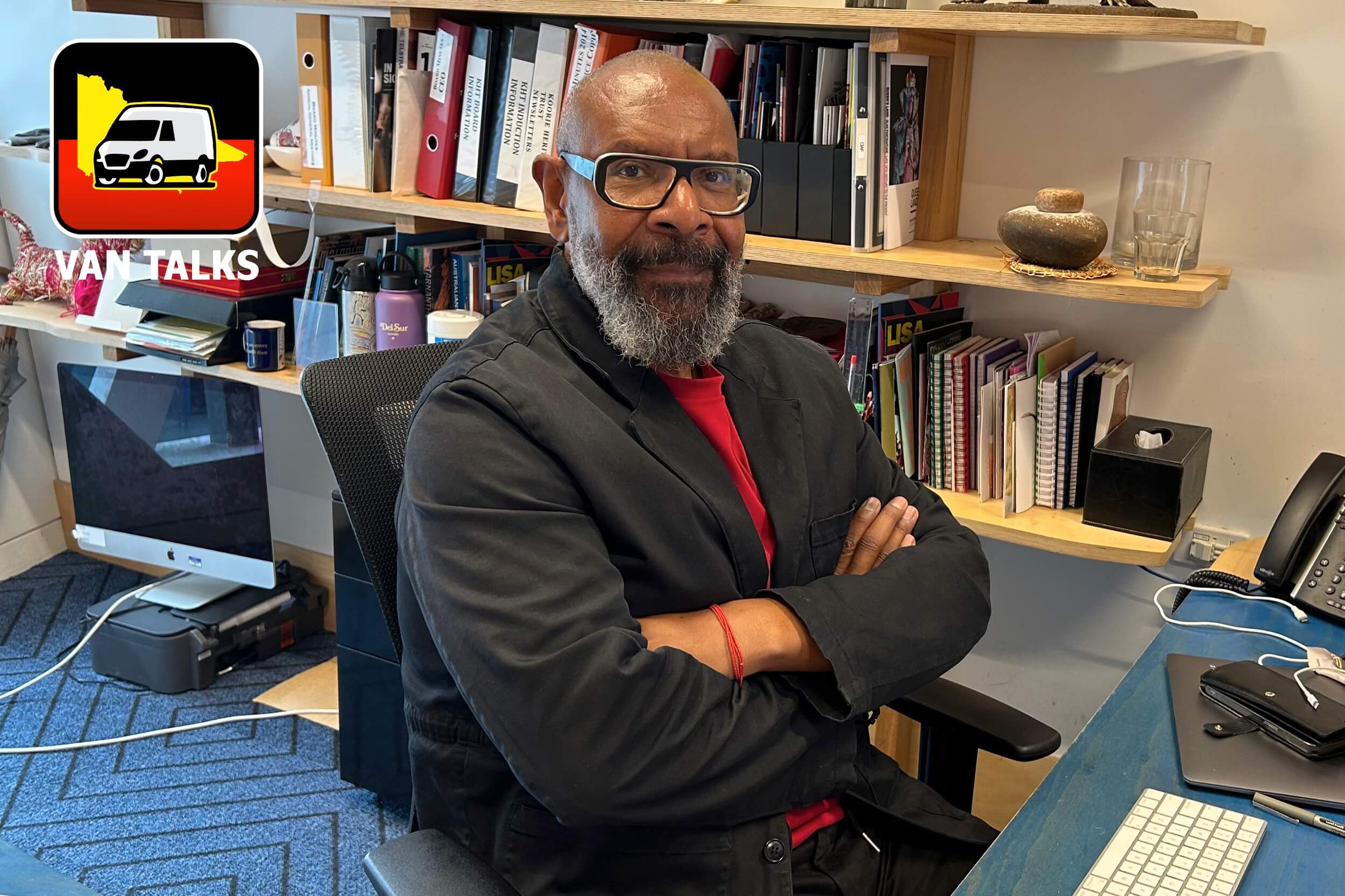Want more on this topic?
Charles Pakana (VAN):
Today I’m up on Taungurung Country in Broadford and I’m joined by the Taungurung Land & Waters Council Executive Manager of Biocultural Landscapes, Taungurung man, Matthew Shanks. Matthew, thanks for joining us on the program today.
Matt Shanks:
Good to be here. Thanks, Charles.
Charles:
Matthew, a little bit of context, what’s the cultural significance of the Yirrangan, or the dingo, within the Taungurung culture?
Matt:
Yirrangan is deeply culturally significant, and it’s a big yarn and it takes our young ones a long time to learn it and to understand because it’s through observation and storytelling. To summarize and be, I guess, aligned with the matter at hand, Yirrangan is considered as kin. Our relationship to dingo is one of family. They’re our brothers and sisters. We live with them and alongside them. They’re also like our teachers and elders. Again, if we think about the matter at hand, what they can teach us is through their role on country and through our observation of how they live and how they undertake that role. It can be understood in a western scientific way as an apex predator, and what they do is bring balance and they show us when there is balance and when they’re hunting in particular areas, resources are good, and we mimic some of those behaviors and some of the way that they move across country.
Charles:
Well, when you mentioned that they’re an apex predator, I suppose this is basic environment 101. But if you can just explain the critical importance of an apex predator in any ecosystem.
Matt:
Again, these things are and can be quite complex because they’re systems. It’s not a linear chain, it’s a web, and everything impacts everything else. An apex predator, in summary, and ecologists can do a far better job of it explaining this than me, but they bring balance. So where there’s too many of particular species, I mean that’s going to mean that there’s an easy feed for dingo and they’ll take them and they’ll therefore reduce grazing pressure. Potentially, too many kangaroos eating too much grass, dingo take some of the roos, less grass eaten. But they also compete through territory with other predators, so other predators will maybe stay out of their territory or be chased away through scent marking and those sorts of things as well. So that can reduce over predation on small vulnerable mammals and the like as well. So they help to bring balance.
Charles:
Are there other competing predators that are naturally occurring in Victoria?
Matt:
Not in the same way the dingo is. Dingo’s the largest. So there’d be fewer of them in a kind of given landscape. There are natural predators, omnivores and carnivores, but at the moment what we see, and this becomes a critical issue in this particular matter of dingo protection, is predators such as foxes and cats that are taking phenomenal amounts of vulnerable native mammals. Those animals that are pre-invasion, dingo’s food. Dingo hunt cat, or they compete with cats and foxes, but those animals and their introduction to Australia is new and on Taungurung country is new. So there’s still a learning that’s being understood and incorporation into the law of country of those species.
Charles:
What impact do you see that this extended unprotection order, which goes through I believe to 2028, will have on the native dingo population on Taungurung country?
Matt:
What we’ve seen to date in regards to dingo populations, through just interaction with humans and conflict with humans post-invasion, is in some parts of central Victoria, they’ve gone locally extinct. In north-west Victoria, the unprotection order was lifted, which is good. We commend that. In north-east and in alpine dingo populations, we’re seeing a decline in the numbers, but also in the health of their homes, in their homelands and in their food sources.
The extension of the unprotection order, it needs to be understood alongside the lifting of the dingo bounty. Now, I get criticized when I call it a dingo bounty. It’s a wild dog bounty, but it’s a dingo bounty.
Charles:
Sure.
Matt:
And the evidence points to that as well. That unprotection order still being in place, effectively means dingo’s can still be killed. If we’re killing members of a population, we’re going to see a decline in the population. We’ll see a decline in the genetic diversity of the population and potentially, as they’re on trajectory towards extinction at the moment, we may see an extinction of those subspecies of dingoes.
Charles:
Tell me about the bounty.
Matt:
The bounty is pretty archaic. If you kill, I guess, legally defined within the bounty in the regulations, a wild dog, and you present a pelt at particular locations run by the government on particular dates, you can receive a payment, and that’s been going for some time.
Charles:
So on the 24th of September, let’s come back to this order in council, which is extending the unprotection order across much of Victoria, wasn’t much of a surprise to the Taungurung and to you?
Matt:
Honestly, no, it wasn’t a surprise. I think what we’ve seen is a lack of evidence, real tangible evidence on not just the impacts to livestock. And to be clear, I’m not denying that dingo eat livestock. Of course, I agree that that is a problem. I don’t think it’s a problem to the extent that maybe is being perpetuated.
Charles:
Well didn’t-
Matt:
I think it’s easy to demonize something than show it love and respect and provide for it what it’s trying to obtain, which is food and sustenance.
Charles:
Didn’t the government actually come out and in the briefing to traditional owner groups in seeking to bring about this extension of the order in council, didn’t it actually quote some figures that could be as low as just several hundred lambing losses to predatory reasons?
Matt:
That’s right. Yeah. The numbers were vague in and of themselves that showed between 650 and 1200 per year since 2014.
Charles:
So what’s the government done to justify this to the Taungurung? And we’ll be contacting all the other TO groups as well.
Matt:
So the government, through DECA, has attempted to engage with traditional owners. They asked a number of questions like, how important is Dingo, and what would you like to see done, and these sorts of things, right at the 12th hour.
Charles:
When you’re saying at the 12th hour, when was this, given that the order in council was announced on the 24th of September, when did that briefing come to you?
Matt:
Approximately a month before. We’d been in conversation for some time in advance of that, and we’ve been trying to build the case and the evidence around the importance of dingo as a ecosystem service as well as the cultural significance of dingo and what that can mean for the health of country by having an apex predator in place.
We’ve seen as well just a lack of real kind of nuanced discussion and understanding publicly about the role of dingo and the actual impacts of dingo, both in terms of negatively to a small number of livestock losses, but also the positive impact, again, that dingo has on country by maintaining balance. And what that means in healthy ecosystem, you have rich nutrient flows from public land and mountainous country, alpine country where alpine dingo are, that flows down river and it flushes flood plains and some of those kind of low montane farm lands and grazing lands. Those ecosystem services are required for healthy agricultural land. It costs us too much to be pumping fertilizers in every year if we’re not generating those ecosystem services.
Charles:
You alluded before that there was not, in your opinion, sufficient consultation and public debate about this particular issue. What do you think should have been done prior to this decision being made by DECA, which is for our audience, the Department of Energy Environment and Climate Action?
Matt:
I’d challenge the language a little bit there, Charles, and in doing so, what I think needs to be done is encourage and resource collaboration. So we would prefer to be having nuanced conversations with decision-makers, with farmers, and those impacted, with ecologists and conservationists, nuanced conversations between all of these groups. They take time, but we’ve had time. We’ve had time all throughout the standing order that’s existed up until it was extended to understand the value of dingo, the impacts, the negative and positive impacts from dingo and different non-lethal ways to manage those impacts from dingo.
We see in other parts of the world, human-animal conflict that are managed in non-lethal ways. We think about tigers and elephants, which are spiritually and culturally significant species that aren’t murdered because they are just existing within their homelands. And yes, that conflicts with human habitation, but there’s ways to manage that. There are rangers to observe and redirect them. There are use of other companion animals to herds and things like that, and there are examples of that where it’s being tested here and elsewhere with dingo and wolf and wild dog, these sorts of things that we should be testing here.
I just think it’s archaic and unethical for an answer to a challenge to just be murder.
Charles:
Why do you think this decision has been made? Is this a political reaction?
Matt:
I think it is a political reaction, but I also think it’s more complicated than that. I don’t think enough time and energy has been given to this matter. I think the root cause of this is that ultimately not enough investment is put into caring for, loving and respecting country. So what that translates to is there’s not enough investment into adequate land management to see a healthy country. What we see through successive government reports, State of the Environment Report, for example, is a continued degradation in the health of country. Now, we’re not investing enough as a state, as a nation in biodiversity outcomes, healthy country outcomes. Our public lands, national parks, state forests, not enough is invested into those to ensure that they’re healthy and safe and therefore providing the services that country provides to us as-
Charles:
Providing food also, for the apex predators, I would assume>
Matt:
Exactly. That’s right. I think because we’re not doing that… And now that’s bigger scale, that’s holistic, it’s larger. It doesn’t point directly to dingo taking lambs, but these are ways to create resilient ecosystems that will mitigate the risks that we’re seeing here because dingo are being forced into contact with humans and livestock and the like, and then there are some negative consequences there to that livestock. So I think it was a reaction in a state of everybody being far too busy, not investing enough into really understanding these problems and creating robust systemic solutions to problems. It’s a Band-Aid fix. It’s reactive.
Charles:
Right. So it does seem to me that this is just a nice quick and easy solution for the state government or for the department, without addressing the ongoing problems, which is the degradation of the entire biosystem. Matt, before we started recording this interview, we were having a yarn about the fact that this is a broader problem, and it does bring into the equation the economics of the entire thing, and that really, even though the farmers may be calling for this culling or the extension of the unprotection order, you’ve got quite a degree of sympathy for the farmers themselves, and that they’re being forced into these drastic reactions and demands. Do you care to expand on that for us?
Matt:
Yeah, absolutely. I think just to add to your point, I think farmers have also called for protections of their livestock and to limit and reduce and eliminate dingoes harming livestock. I don’t think anybody has explicitly been about advocating for killing dingo. That’s just one of the easy ways to limit the impact. I think that’s an important kind of distinction in this matter. I think, similarly, to what I said about we as a state and a nation, we’re not investing in the health of country. That extends everywhere, and I think we’re seeing all the time in the media and stories from on the ground and local communities and farming communities and otherwise, those that live off the land from country, it’s harder and harder every year to do so because it’s more and more expensive. There’s not enough support, these sorts of things. That’s that same sort of concept that I’m talking about in terms of the rest of [inaudible 00:13:51].
Charles:
It seems what you’re saying to me is, in a roundabout way, farmers are being screwed?
Matt:
Yeah, I absolutely agree to that. As a Taungurung man, a big part of our law is about respect, about ensuring that people are safe when they come to our country. That is what a welcome to country is all about.
Charles:
Of course.
Matt:
And undertaking our cultural obligations. You’re here visiting us today, Charles, and I have obligations to you that you’re healthy and that you’re safe during your visit. That extends more broadly. We want to be able to undertake our cultural obligations. We want to work with and support farmers in these challenges. We also want to be working with them to share our knowledge and practice around landscapes and observing different climate scenarios and what have you, that’s happened over deep time that we’re aware of. And that will have a positive impact on their agricultural practices. We can share our agricultural practices that we performed and the different landscapes that we utilized and those first settlers observed, and they brought their practices and their species into those systems that were able to hold and nurture crops and livestock and all the rest of it.
There’s an opportunity here to work together, and this unprotection order, it creates a two-sided approach. Humans against dingo, farmers against traditional owners, and I think that’s the opposite of what everybody wants. We want to solve problems together. We want to get back to the root of what humanity is, which is community and working together to solve problems, not just slap Band-Aids on them.
Charles:
What would you like to see done right now? Given that the unprotection order is unlikely to be lifted, it’s going to go through to 2028, what would you like to see that the Taungurung and the agricultural community across your country do together?
Matt:
I’d like to work as well with the state, have all three parties, and I’d like to work together to towards testing and trialing different non-lethal methodologies. Hopefully, that shows positive examples that we can apply in advance of 2028 so that we see less hunting and killing of dingoes and a reduction in livestock losses because of those kinds of interactions being brought in.
Charles:
We’re talking about lethal measures, and in reading the order in council extending the unprotection order, it’s fairly bleak when it comes to being a dingo on this country. They’re talking about the 1080 compound, which is a banned substance in most parts of the world, and we’ll be speaking to a toxicologist about that in a future interview. We’re talking about leg traps in which dingoes can be left in absolute agony for 24 hours before someone can come along and put them to their death. This level of cruelty, how does that impact on traditional owners, given that there is that kinship with this animal?
Matt:
I said at the start, Charles, that the decision wasn’t surprising. It wasn’t surprising. And I was reflecting to some of my uncles that despite it not being surprising, it was more devastating than I expected it to be. I expected this decision to come down and then when it was announced, it was devastating.
Charles:
Let’s throw it back to you, Matt. What work actually needs to be done by the Taungurung and by other impacted TO groups to essentially bring about a revocation of this extension of the unprotection order?
Matt:
It’s a great question, and I think number one, we need to come together and have some conversations. We need to support each other in response to this quite devastating decision and the impacts on our community. But I think as we’ve always done since invasion, is there with open arms and we’ve invited conversations, we’ve invited understanding, we’ve tried to share our knowledge and our lore to invaders, and we continue to do so today. We need to figure out how we want to do that, and then we need to sit down with the government. We need to sit down with farmers and those impacted and have some robust, respectful conversations about how we might do things differently.
Charles:
Do you think the government will listen to you if you and the other traditional owner groups that are impacted, and I believe it’s the Wurundjeri, Woiwurrung, the Bunurong, Gunaikurnai and others as well, that have been impacted, if these traditional owner groups were to come together, do you believe the government would listen, and is there a possibility of a revocation of this order?
Matt:
So I think there’s a difference between listening and acting, Charles. I think they’ll listen. I think we’ve got to push them pretty hard and make some really reasonable recommendations that I know we already have and can do, but it really is up to the appetite with a revocation that’s going to upset some people. So there needs to be clear solutions in place, and I guess that’s what I’m here telling you, that we’re willing and committed to work towards and we want to collaborate with all towards those.
Charles:
We will be pursuing this story with a number of other interviews. We’ll be chasing up with the other traditional owner groups, toxicologists, animal welfare experts, and various other experts as well. So Matt, for the meantime, we will be back. We will be talking about this, hopefully, maybe in 2025 with a revocation looming ahead of us. But thank you so much indeed for your time.
Matt:
Thank you.








0 Comments